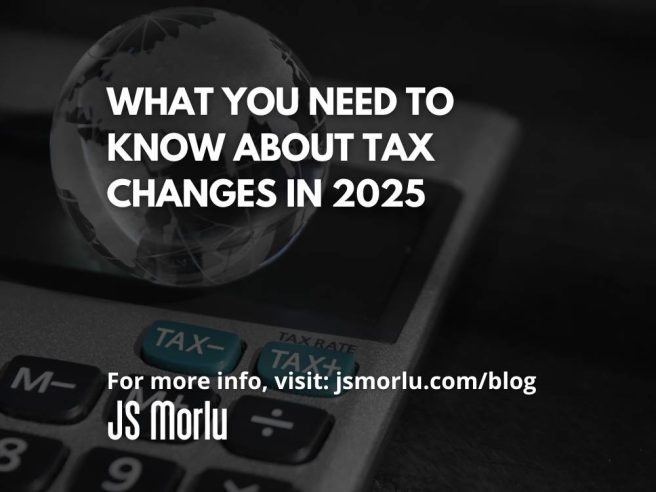As 2025 approaches, taxpayers, businesses, and financial professionals need to brace for significant changes in the U.S. tax landscape. From the sunset of key provisions in the Tax Cuts and Jobs Act (TCJA) to inflation adjustments and potential legislative updates, staying informed is essential to minimize financial surprises. This blog will break down these anticipated changes and offer insights into how you can prepare.
Expiration of Key TCJA Provisions
The Tax Cuts and Jobs Act (TCJA), enacted in 2017, introduced comprehensive tax reforms that have shaped the current tax environment. However, many of its provisions were temporary and are set to expire at the end of 2025. Here are the critical changes:
1. Individual Tax Rates
The current tax brackets and rates, which many taxpayers have benefited from, will revert to pre-TCJA levels unless Congress acts. This could mean:
- The top individual tax rate increasing from 37% to 39.6%.
- Higher tax liabilities for households across various income levels.
2. Standard Deduction and Personal Exemptions
- The enhanced standard deduction, currently $13,850 for single filers and $27,700 for married couples filing jointly, will decrease substantially.
- Personal exemptions, eliminated under the TCJA, are set to return, though their impact will vary depending on individual circumstances.
3. Child Tax Credit
- The current credit of $2,000 per qualifying child is expected to drop to $1,000.
- Stricter income thresholds will make it less accessible to middle-income families.
4. State and Local Tax (SALT) Deduction Limit
- The current $10,000 cap on SALT deductions is set to expire. Discussions in Congress range from raising the cap to $20,000 to letting it expire entirely, which would benefit higher-income taxpayers.
These changes have the potential to increase tax bills for many Americans. While some adjustments, such as the SALT cap expiration, may reduce taxes for select groups, proactive planning is vital to mitigate negative impacts.
IRS Inflation Adjustments
To address inflation, the IRS adjusts various tax provisions annually. Key updates for 2025 include:
- Tax Brackets: Income thresholds for each tax bracket will rise, providing some relief by reducing the impact of inflation-driven income growth on tax liabilities.
- Standard Deduction: Expected to increase slightly, with single filers likely eligible for a $15,000 deduction and joint filers for $30,000.
- Earned Income Tax Credit (EITC): Income limits and maximum credit amounts will increase. For example, the maximum EITC will rise from $7,830 in 2024 to $8,046 in 2025, benefiting low- to moderate-income workers.
These adjustments are designed to prevent “bracket creep,” ensuring taxpayers aren’t pushed into higher tax brackets solely due to inflation.
Retirement Contributions
For retirement savers, 2025 brings some welcome changes:
1. 401(k) Plans
- The elective deferral limit will increase from $23,000 in 2024 to $23,500 in 2025, allowing employees to save more on a tax-deferred basis.
2. Catch-Up Contributions
- For those aged 50 and older, the catch-up contribution limit remains unchanged at $7,500.
- New for 2025: Taxpayers aged 60 to 63 will benefit from a higher catch-up limit of $11,250, offering additional opportunities to bolster retirement savings.
These increases reflect the IRS’s commitment to aligning contribution limits with inflation, ensuring Americans can adequately prepare for their retirement years.
Legislative Developments on the Horizon
The political landscape in 2025, shaped by the presidential election and Congressional debates, could lead to further tax changes. Key issues under discussion include:
- Extending Individual Tax Cuts: Policymakers are debating whether to make the current lower tax rates permanent to prevent a tax hike for millions of Americans.
- Child Tax Credit Expansion: Proposals to maintain the current $2,000 credit or increase it further are gaining momentum, reflecting the importance of this credit for families.
- New Tax Incentives:Discussions about introducing incentives for clean energy investments and small businesses could result in new opportunities for tax savings.
Additionally, proposals targeting housing affordability—like credits for first-time homebuyers—and investments in healthcare access could also enter the legislative agenda.
How to Prepare
The potential tax changes in 2025 highlight the importance of proactive financial planning. Here are steps you can take:
1. Review Your Tax Situation
- Evaluate how the expiration of TCJA provisions might affect your liabilities.
- Consider adjusting your withholdings or estimated tax payments if necessary.
2. Maximize Retirement Contributions
- Take advantage of increased contribution limits for 401(k) plans and catch-up contributions.
3. Plan for Legislative Uncertainty
- Stay informed about potential legislative changes and consult a tax professional to understand how they might impact your finances.
4. Explore Deductions and Credits
- Consider strategies to optimize deductions and credits, especially if income thresholds or amounts change.
5. Utilize Expert Advice
- Tax professionals can provide tailored guidance and help you navigate these changes to maximize your financial position.
Conclusion
Tax changes in 2025 could have wide-reaching implications for individuals and businesses. Whether it’s the expiration of TCJA provisions, IRS inflation adjustments, or potential new legislation, understanding what lies ahead is essential for effective financial planning.
For personalized advice and assistance in navigating these changes, contact us. Our team of experts is here to help you make informed decisions and prepare for the future with confidence.
JS Morlu LLC is a top-tier accounting firm based in Woodbridge, Virginia, with a team of highly experienced and qualified CPAs and business advisors. We are dedicated to providing comprehensive accounting, tax, and business advisory services to clients throughout the Washington, D.C. Metro Area and the surrounding regions. With over a decade of experience, we have cultivated a deep understanding of our clients’ needs and aspirations. We recognize that our clients seek more than just value-added accounting services; they seek a trusted partner who can guide them towards achieving their business goals and personal financial well-being.
Talk to us || What our clients says about us


